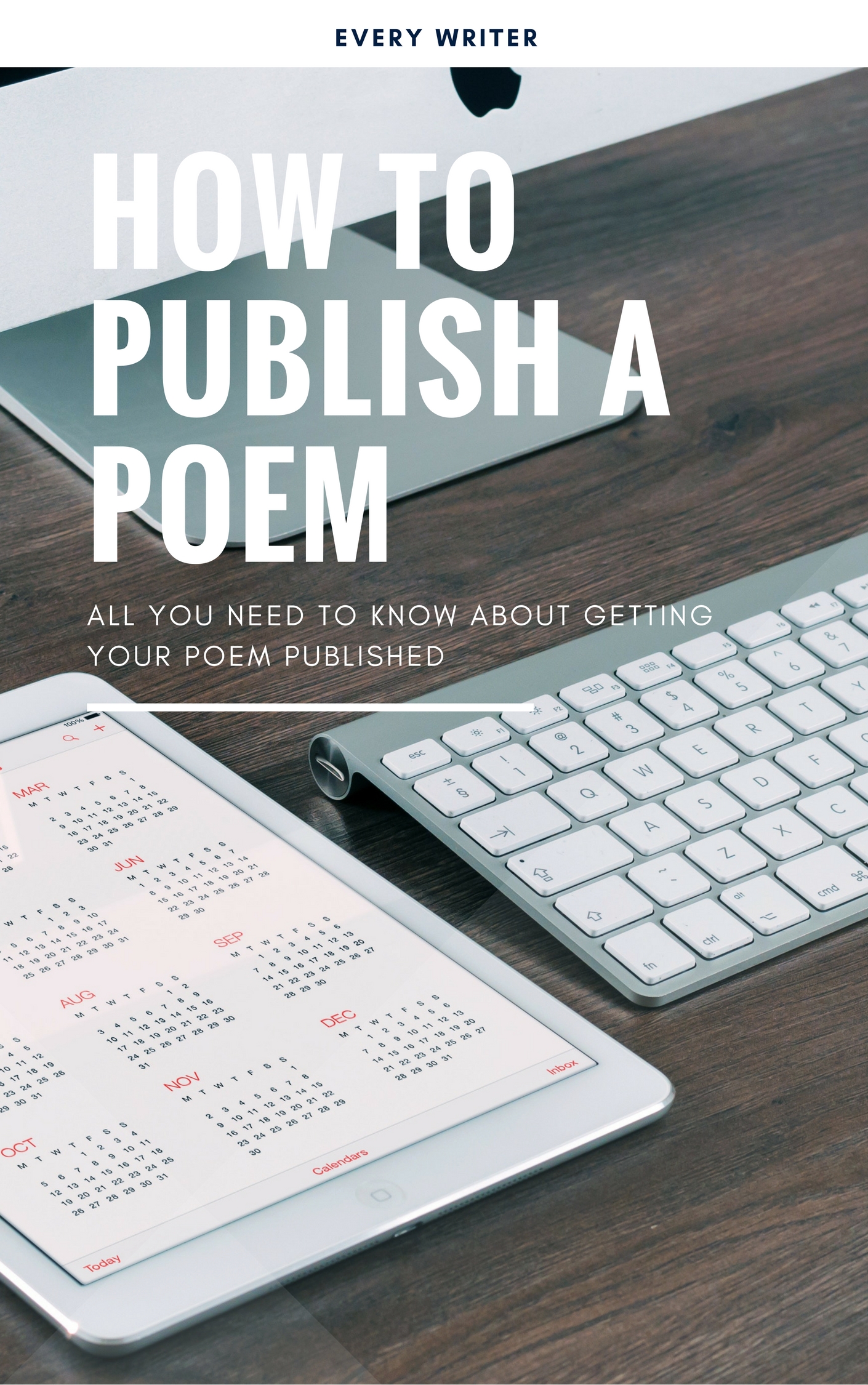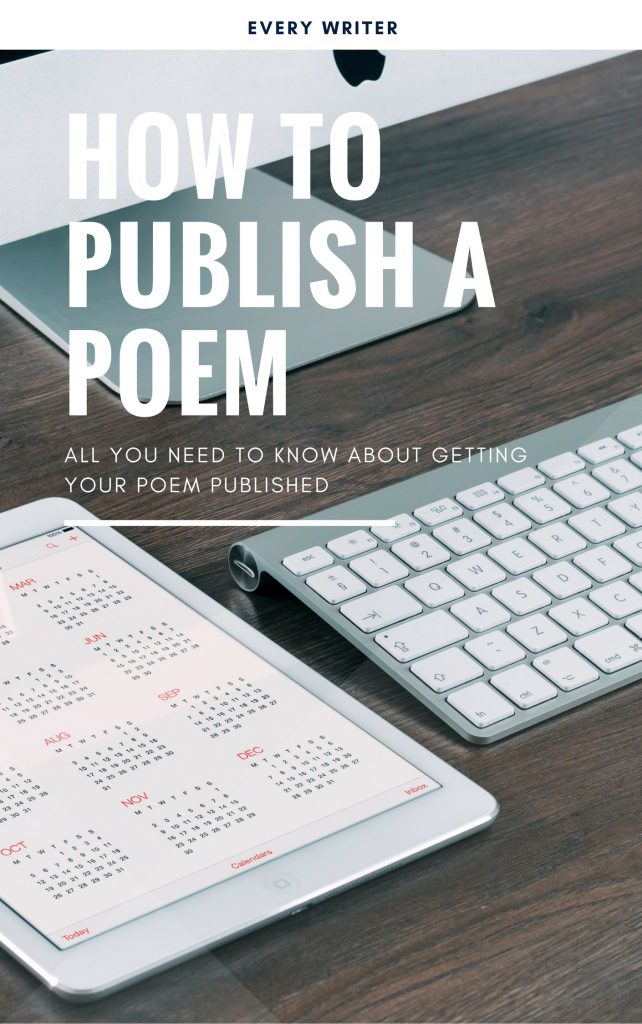How to Publish a Poem
This article, “How to Publish a Poem” is one of our old articles that was titled “How to Submit a Poem.” We have changed it somewhat, and changed the title, but most of the information is the same. The link to How to Submit a Poem redirects here. I changed it because I believe how to submit a poem and how to publish a poem are really one in the same. If you keep trying at the first the second will eventually happen. KEEP WRITING. NEVER STOP.
It seems silly to some, but a lot of new writers, or new-to-publishing writers ask me, “How do I publish a poem?” They usually have specific questions, “I was thinking about submitting a poem, but I don’t know a lot about poetry…” Even though it is usually a simple process there are a few pointers that will help new writers have the best chance of publishing. It takes time, and you have to keep trying.
- Read the Publication! Find a Market
This goes for any submission of your work. You need to find a market, and the best way to do this is to read read read. I know some writers that get offended that a certain publication rejected them. They say something like, “I’ve been published in [insert outstanding publication] and this little journal rejected me?” Well the truth is most editors know what they like. Many have a certain quirks to them, and if your writing doesn’t fit, it doesn’t matter how good it is, they won’t publish it. I knew a writer once who started sending his work to great publications, and worked his way down a list until he got to what he thought of as a bad publication. All of them said NO. He took a step back, spent a lot of time reading, and then sent his work to a very good publication that had recently published a story like one of his. They accepted it. Know your editors. Know what they are looking for. Read the publications you are sending your work to.
There a couple sites where you can find literary magazines to submit your work to. I believe ours is the best. It’s free. We have 1000s of markets and it’s searchable.
- Pick your best work
Don’t fall into the trap of “Oh that publication isn’t good enough for my best work.” If you have been published many times that might be an argument, but if you are just starting out, try, try, try. Send your best.
- Simultaneous Submissions
Many writers ask about this, and most editors hate them. The truth is it is a reality of publishing. You more than likely will have to submit your work to more than one publication at a time. Editors tend to hate them because they have gone to publish a good poem and found it has already been published. Speaking as someone who has edited a few journals and zines, I know how much of a pain it is not to be told a work has been published. Should you tell the editor that you are submitting simultaneously? Most magazines say that you have to disclose the fact that you are submitting to another journal. The truth is, yes, and I’ll say it, it does count against you. If I’m considering 2 pieces and my return time is say 6 months or even 3 months, I know that this author has been submitting this work over and over again. The truth is all editors of poetry should know that the work is going to be submitted to more than one publication, and it is silly to even ask.
MOST IMPORTANT RULE: if your work gets published make sure you email or contact each publication you have submitted it to and tell them. If they send you a letter of acceptance and you send back that it has been published already, you will be blacklisted. This means you will never be publish in that journal, ever ever. Also if you think you’ll just let it go through remember that most journals take the first time publication rights. Just keep that in mind.
- 3 to 5 to 6 poems
Most magazines or journals will put a limit on how many poems you can send. Do not exceed this limit. Many times the editors will simply throw out the whole submission if they get too many poems from one author. Make sure you stay within the limit. It makes you look desperate if you send more than the number of poems they ask for. On the other hand make sure you send at least the lowest number they are asking for. If it says send 3 to 5 poems, at least send three. You are increasing your chances, of course. You also look smug if you send only one poem.
- Line Breaks
Make sure your formatting comes through to the editor. If you are sending an email, and you paste it in the body of the email, sometimes the poem won’t keep its formatting. You may have to attach an rft. If the journal says they will not take attachments don’t send them, they will simply delete them. If you send your poem in the body of an email you might want to write later to ask if it came through okay. Most very well established journals are using submission software. If they have their own system use it. Sending it in a pdf. is a good idea, if the journal accepts the format.
- Send your work to the right place!
Pay close attention to the submission guidelines outlined by the journal. Many journals will have a specific editor you need to send the submission to. If you send your submission to the wrong editor it goes in the trash. Also, some journals now are using online submissions programs. Make sure you follow all their guidelines so your submissions makes it through.
Writer a cover letter to send with your submissions. You can write one letter and change it each time you send a submission, but make sure to include some niceties like “I read your journal and liked…” also include what you are sending “3 poems titled…” so the editor knows what to look for. Make the letter professional. Many editors are used to taking snail mail submissions from the yesteryears of 5 or 6 years ago. Some are, I hate to say, a little bitter about taking online submissions in the first place. Don’t give them more reasons to toss your work. Make your letter professional, and be polite about the process. You can also visit our page that tells you how to write a cover letter with examples. It’s a quick read, right to the point.
- Keep a log
Sending out poetry gets a little complicated sometimes. Keep a log of when, where, and what you send. If you forget where you published a piece you might just publish it twice, or worse you might get mixed up and not know if it was published at all. It happens more often than you might think. If you send 4 poems to 3 journals a week for a year you will have submitted to 156 journals, and you will have submitted 624 poems. That number could be on the low side. If you consider you are only submitting to about 12 journals a month, this isn’t too far outside what persistent writers do. Keep a chart.
- Write a bio
 Yes you need to send some kind of bio. If you have published before include your “best” publications, if you haven’t published just say your city and occupation: John Smith is working on his first collection of poetry to be finished April of 2009. He is a truck driver who has been influenced heavily by the open road. He currently lives with his dog Adam in New York city.” Write the bio in third person. Many zine editors will just cut, clean up, and paste your bio. It saves time and effort, so help them as much as possible. It is not always a strike against you if you have not been published. Most editors will give more creed to well published writers, but they do not disqualify if you have not published. If you need help, we have an article that talks about this, How to write a bio.
Yes you need to send some kind of bio. If you have published before include your “best” publications, if you haven’t published just say your city and occupation: John Smith is working on his first collection of poetry to be finished April of 2009. He is a truck driver who has been influenced heavily by the open road. He currently lives with his dog Adam in New York city.” Write the bio in third person. Many zine editors will just cut, clean up, and paste your bio. It saves time and effort, so help them as much as possible. It is not always a strike against you if you have not been published. Most editors will give more creed to well published writers, but they do not disqualify if you have not published. If you need help, we have an article that talks about this, How to write a bio.
- Keep trying
Journals are going to say no. It is that simple. Every writer is rejected. Use the time you are submitting your works to write new pieces. Keep writing. Keep trying. Submitting a poem is how you publish a poem!
- How to Build Unstoppable Story Tension: 5 Proven Techniques (+ Free Worksheet) - July 3, 2025
- The Kindness and Quiet Desire of Strawberries - July 2, 2025
- Science Fiction Quiz #1 - May 21, 2025




Great list. I believe that the 6 topic is the most important, because must of the time the writers don’t give it the proper attention.
Thank you from a beginner. This was extremely encouraging as well as helpful.
Steve
I’ve had poems published twice: As far as simultaneous submissions go, I had a good hundred unpublished poems in my name… So, if this is the case, “C’mon: send one poem to each company!” When the first is done rejecting you, send it again to the next victim!
This article, “How to Publish Poetry” is one of our old articles entitled “How to Send Poetry.” We’ve changed it a bit, and changed the title, but most of the information is the same. We wrote about 99papers last year. The link to How to Submit Poetry is transferred here. I changed it because I believed the way to send poetry and how to publish poetry were really the same. If you keep trying at first the second will eventually happen. STAY WRITING. NEVER STOP.
This content is written very well. Your use of formatting when making your points makes your observations very clear and easy to understand
Publishing a poem can be a satisfying and creative endeavor. Keep in mind that rejection is a common part of the publishing process, and many successful poets face many rejections before their work is accepted. Continue to improve your craft and submit your poetry to various publications to increase your chances of being published.
As a beginner this is the perfect guide and the steps are clear to understand. People can learn how they can write a poem and can publish with the right audience. thanks for a great read with full information.